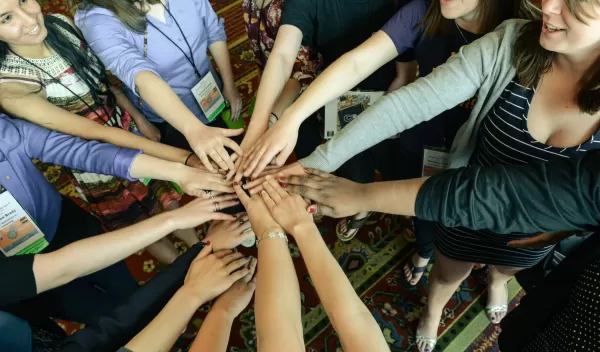
Addressing the shortage of women in technology
Last month, the blogosphere exploded with backlash against the messaging in the book "Barbie: I Can Be a Computer Engineer," which implied that women produce stories and design, while men do the technical work.
Mattel, Inc. officially apologized and pulled the book, but the event served as a reminder that media and popular culture play a critical role in shaping children's beliefs, defining the types of technical roles they imagine for themselves and ultimately determining what kind of people create the technologies we all use.
The United States is in the middle of a vital time in computing, when women are underrepresented and diverse talent is needed to fill an estimated 1.2 million computing-related, U.S. job openings expected by 2022. At the current rate, U.S. computing undergraduates only can fill about 39 percent of these jobs.
Girls represent a valuable, mostly untapped, talent pool, and their lack of participation has serious consequences for the future of technical innovation. According to National Center for Women & Information Technology (NCWIT), a nonprofit organization that works to correct the imbalance of gender diversity in technology and computing, if technology is designed by half our population, we're missing out on the solutions and creations that the other 50 percent could bring.
Another obstacle: half of the United States doesn't allow computer science to count as a math or science graduation requirement, and the number of high schools offering Advanced Placement (AP) computer science (CS) is down 35 percent since 2005. Informal introductions to CS impact all students, especially girls and many underrepresented youth who have fewer occasions to gain experience.
NCWIT uses a unique model to recruit, retain and advance women in computing. "Change leaders," both men and women, are grouped into alliances by sectors of the pipeline--K-12, academic, workforce, entrepreneurial and affinity group. Alliance members convene annually at a NCWIT Summit to share lessons learned and hear about new ideas and theories from social scientists.
Throughout the year, NCWIT members participate in action-oriented campaigns and programs, such as building a national female talent pipeline for computing (NCWIT Aspirations in Computing), supporting awareness and training for professional school counselors (Counselors for Computing), and changing the image of computing (Sit With Me). All of NCWIT's efforts are backed by researched-based practices, for implementing change and raising awareness for women in technology.
"Our mission is not a job for one individual or one organization. The NCWIT structure brings together individuals' and organizations' previously isolated efforts and arms them with effective practices for increasing the meaningful participation of women in technology," said NCWIT CEO and co-founder Lucy Sanders. "Through the remarkable work of our dedicated members who volunteer their time to advance our collective mission, we're demonstrating a considerable national impact."
The partnership between NCWIT and the National Science Foundation (NSF) extends back to 2004, when NSF originally chartered the organization. Since then, NCWIT has grown to a community of more than 575 universities, companies, non-profits and government organizations nationwide.
The NCWIT Aspirations in Computing program is one exemplary effort that engages the rapidly growing coalition of NCWIT members and young women from 5th grade through graduate school. In the program, sponsors and academic, corporate, entrepreneurial and non-profit members unite to provide structured, long-term support for young women entering technical fields. They offer scholarships and internships, host award events and more.
Nearly 2,000 middle-school girls in 23 states have received 115,000 hours of computing education through NCWIT AspireIT, an outreach program with an innovative "near-peer" approach that enlists high school and college women to lead technical programs for younger girls.
Additionally, more than 3,300 young women in the United States have been recognized with the NCWIT Award for Aspirations in Computing since 2007. The majority of college-age winners who responded to an NCWIT survey (83 percent) are majoring or minoring in science, technology, engineering and mathematics fields, and 57 percent are majoring or minoring in computer science or computer engineering.
Award recipients consistently report greater confidence in their technical abilities, increased enthusiasm about computing and greater awareness of the career opportunities available to them.
"Because of this award, I'm more inclined to pursue computer science," said one award recipient. "I am more encouraged and motivated to continue with my studies and expose more young girls to computer science."
"Because of this award, I'm less skeptical of computer science as a profession," echoed another recipient. "Those in the industry really showed me that computer science can be applied beyond the basic code I've learned so far."
The power of ongoing encouragement shouldn't be underestimated. Research shows it is one of the most influential factors in girls' decisions to pursue computing education and careers. In a world where technology increasingly permeates every aspect of society, capitalizing on the benefits of women's participation results in innovation that is as broad as the population it serves.
